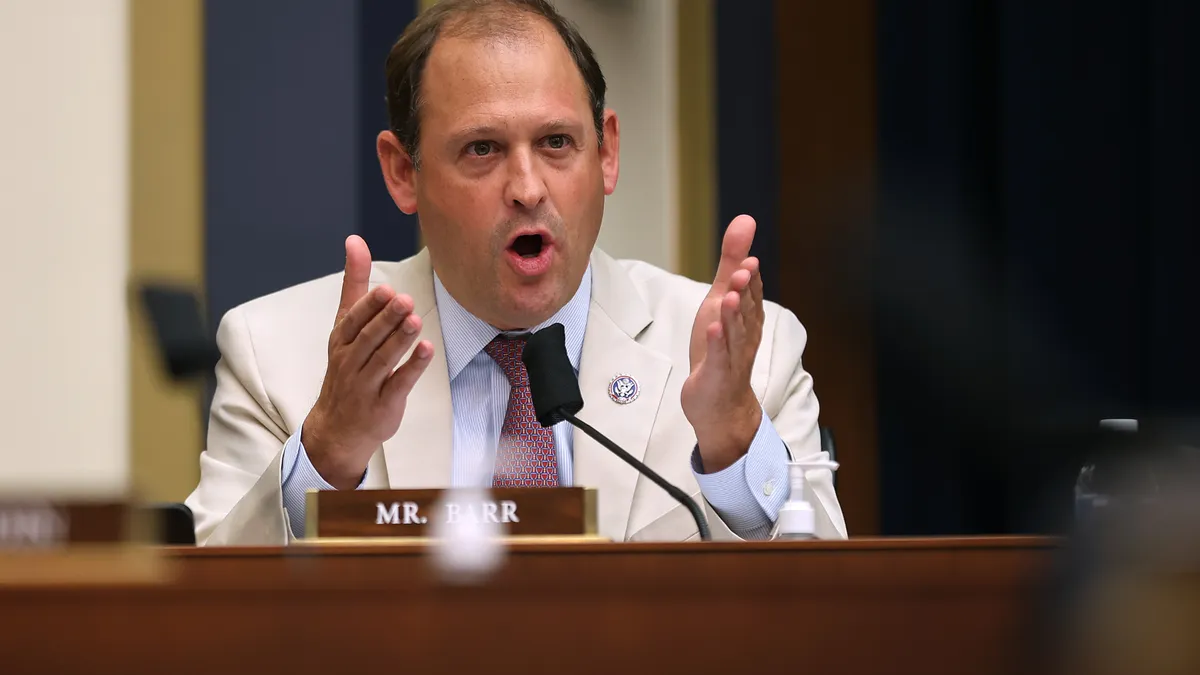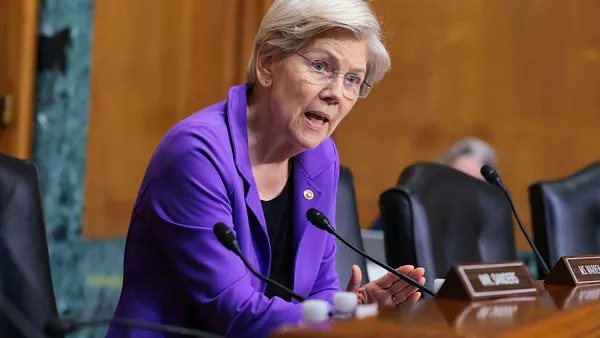Reps. Andy Barr, R-KY and Ritchie Torres, D-NY, introduced Wednesday a House version of a bill that would phase out reputational risk as a metric in bank supervision.
The measure is aimed at addressing “the regulatory abuses that occurred under initiatives like Operation Choke Point,” where federal banking agencies used reputational risk to limit access to financial services to certain industries, according to the press release announcing the bill.
“For too long, unelected regulators have used the vague and subjective concept of reputational risk to push political ideology under the guise of bank supervision,” Barr said, adding the bill would help restore “neutrality and integrity” of the financial regulatory system.
Torres said the legislation will “ensure access to banking is determined by sound business practices — not partisan pressure.”
The Senate version of the bill was introduced last month by Tim Scott, R-SC, chair of the chamber’s banking committee. The legislation seeks to omit all references to reputational risk in regulatory supervision. Scott tagged the bill as the first step to end de-banking, which is among his top priorities.
“Debanking federally legal businesses and law-abiding citizens is un-American, but unfortunately, we’ve seen federal banking regulators abuse ‘reputational risk’ to carry out political agendas and force financial institutions to cut off access to financial services for Americans,” Scott said in a statement Wednesday.
Scott applauded Barr for introducing the House bill and leading the effort to end this “discriminatory practice.”
As part of Scott’s bill, the Federal Reserve, the Office of the Comptroller of the Currency, the Federal Deposit Insurance Corp. and the National Credit Union Administration would not be able to promote new rules based on reputational risk and would need to report to Congress that they have removed reputational risk as a component of supervision.
Within two weeks of Scott introducing the bill, the OCC said it would stop examining its regulated financial institutions for reputational risk and is removing reputation risk references from the agency’s handbooks and guidance. Soon after, Travis Hill, the FDIC’s acting chair, said the agency would stop using reputational risk in its supervision of financial institutions, saying reputational risk “has been abused in the past, and adds no value from a safety and soundness perspective as a standalone risk.”
De-banking was thrust into the collective consciousness in January, when President Donald Trump called out Bank of America and JPMorgan Chase during a virtual appearance at the World Economic Forum in Davos, Switzerland, alleging the banks dropped conservative customers.
“We bank everybody,” BofA CEO Brian Moynihan said at a separate appearance in February, clarifying, “the real question was about over-regulation, frankly.”
The Trump Organization sued Capital One last month, alleging the bank closed around 300 Trump Organization accounts over “woke” beliefs and political and social motivations.
Though it’s largely been Republicans taking aim at de-banking, Torres has support from at least one Democratic senator: Elizabeth Warren of Massachusetts.
At a February hearing examining the impacts of de-banking, Warren cited analysis that notes nearly 12,000 de-banking-related complaints were filed by consumers over the past three years, with more than half of those complaints made against the four biggest U.S. banks – JPMorgan Chase, Bank of America, Citi and Wells Fargo.
“This shouldn’t be happening, and we need to figure out why and who is responsible,” she said.
Last week, during the Senate Banking Committee’s vote to approve Jonathan Gould’s nomination to lead the OCC, Scott said Gould would bring firsthand experience to the agency and “will put an end to politically motivated debanking and ensure financial institutions serve all credit-worthy Americans, not just those favored by Washington bureaucrats.”















